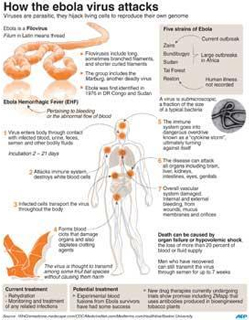
Preliminary post-mortem examination carried out on the body confirmed the findings, according to Rana Saydalani, an official spokesman from the WHO Regional Office for the Eastern Mediterranean.
“We are coordinating with regional health ministries to review any suspected case of infection,” she said.
“A sample has also been sent to a German laboratory for further testing.”
Al-Zahrani, a businessman in his 40s, died at King Fahd Hospital, where he was admitted on Monday night after showing symptoms of viral hemorrhagic fever.
Health Ministry spokesman Khalid Mirghalani confirmed the report after tests had been conducted at the US Center for Disease Control and Prevention (CDC) in Atlanta, Georgia, which has a special laboratory for testing the most dangerous of microbes. “Tests revealed that Ebola virus was not the cause of this patient’s illness,” he said.
The CDC is conducting additional tests to confirm the negative Ebola finding and will carry out more advanced tests to identify what kind of virus had afflicted the patient.
Additional Ebola tests will also be conducted on samples that have been sent to another international reference laboratory in Hamburg, Germany.
“The results of these tests will be released to the public once they are complete,” said Mirghalani.
The statement added that it would adopt strict quarantine measures if any suspected cases surface.
A rapid response team at the ministry’s disease control center, meanwhile, is conducting Kingdom-wide around-the-clock surveillance for contagious diseases.
The patient became symptomatic after traveling to a country that had been one of the hardest hit by the Ebola outbreak in West Africa, where more than 960 people have died from the disease.
Al-Zahrani was identified as a suspected Ebola case because of his symptoms and travel history and was transferred to a specialized hospital in Jeddah, after which the WHO and general public were notified.
He died on Wednesday while being treated in quarantine.
“The Health Ministry continues to monitor individuals who came into contact with the patient while he was exhibiting symptoms of viral hemorrhagic fever as a precautionary measure,” he said.
“This was the only suspected Ebola case identified in the Kingdom.” The ministry issued an advisory on Wednesday urging Saudi citizens and residents to postpone travel to Sierra Leone, Guinea and Liberia until further notice.
In addition, the Kingdom stopped issuing visas to Umrah and Haj pilgrims from these countries as a precautionary measure.
Health teams are also closely monitoring incoming passengers at international airports and other entry points, the statement said.





Comments
Add new comment